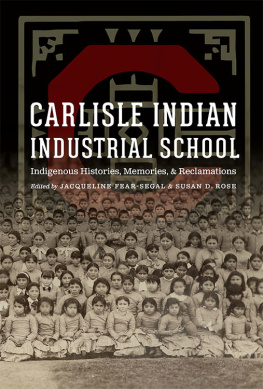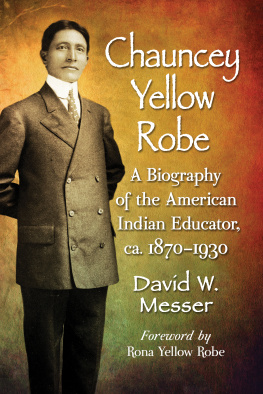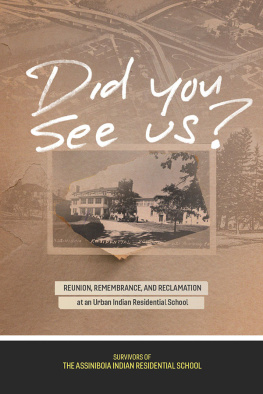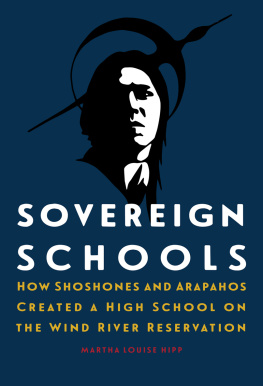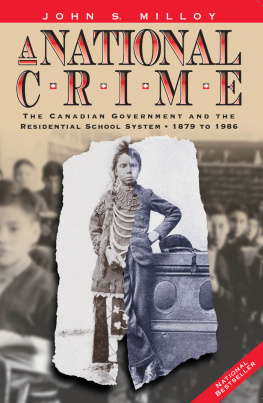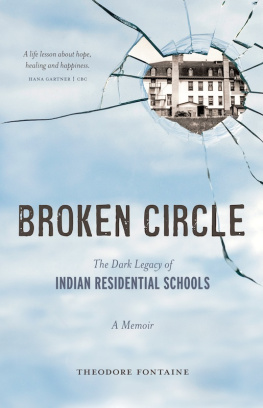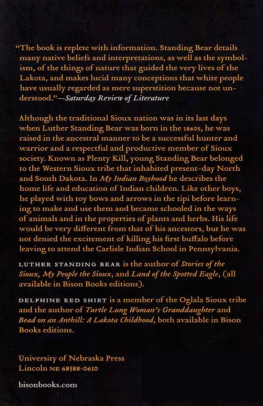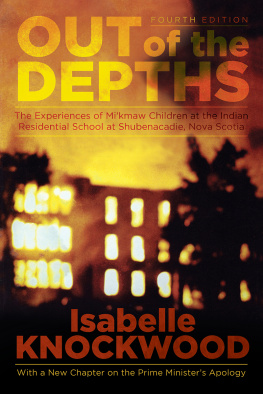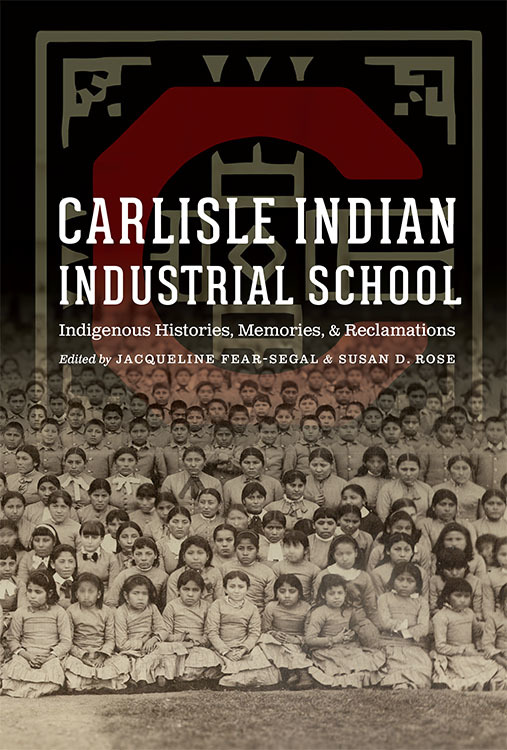By bringing together such a diverse range of voicesacademics and non-academics, Native and non-Nativesto speak about the history and legacy of what remains the most well-known Indian boarding school, this book does us all a great service. The contributors share their important stories with exceptional grace, insight, and power.
Stephen Amerman, professor of history at Southern Connecticut State University and author of Urban Indians in Phoenix Schools, 19402000
Brenda J. Child
John W. Tippeconnic III
Carlisle Indian Industrial School
Indigenous Histories, Memories, and Reclamations
Edited by Jacqueline Fear-Segal and Susan D. Rose
University of Nebraska Press | Lincoln and London
2016 by the Board of Regents of the University of Nebraska
Cover designed by University of Nebraska Press; cover image by John N. Choate and courtesy the Cumberland County Historical Society, Carlisle PA , PA - CH 2-01
An earlier version of chapter 3 was previously published as Photograph: Carlisle Indian School (18791918) in Studies in American Indian Literatures, 2nd ser., 4, no. 2 (Winter 1992).
An earlier version of chapter 15 was previously published as Dickinson College Builds Carlisle Indian Industrial School Resource Center in Native American and Indigenous Studies 1, no. 2 (Fall 2014). 2014 by the Native American and Indigenous Studies Association. Used with permission of the University of Minnesota Press.
All rights reserved
Library of Congress Cataloging-in-Publication Data
Names: Fear-Segal, Jacqueline, editor of compilation. | Rose, Susan D., 1955 editor of compilation.
Title: Carlisle Indian Industrial School: indigenous histories, memories, and reclamations / edited by Jacqueline Fear-Segal and Susan D. Rose.
Description: Lincoln: University of Nebraska Press, [2016] | Series: Indigenous education | Includes bibliographical references and index.
Identifiers: LCCN 2016013673
ISBN 9780803278912 (cloth: alk. paper)
ISBN 9780803295070 (epub)
ISBN 9780803295087 (mobi)
ISBN 9780803295094 (pdf)
Subjects: LCSH : United States Indian School (Carlisle, Pa.)History. | Off-reservation boarding schoolsPennsylvaniaCarlisleHistory. | Indians of North AmericaCultural assimilationUnited States. | Indians of North AmericaEducationPennsylvaniaCarlisleHistory. | Indians of North AmericaCultural assimilationPennsylvaniaCarlisleHistory. | Indians of North AmericaPennsylvaniaCarlisleEthnic identityHistory. | Indian studentsRelocationUnited StatesHistory. | Indians, Treatment ofUnited StatesHistory. | Collective memoryUnited States. | Racism in educationPennsylvaniaCarlisleHistory.
Classification: LCC E 97.6. C 2 C 365 2016 | DDC 371.829/97074843dc23
LC record available at http://lccn.loc.gov/2016013673
The publisher does not have any control over and does not assume any responsibility for author or third-party websites or their content.
We respectfully dedicate this book to all Carlisle Indian School students, their descendants, communities, and nations, and all indigenous peoples who have been affected by educational campaigns of cultural genocide.
All royalties from this volume will be paid into the Carlisle Indian School Project Fund (housed at the Community Studies Center, Dickinson College) and will contribute to future Carlisle symposia and other events and projects (such as converting the Carlisle Farmhouse into a heritage center) that increase and disseminate knowledge of Indian boarding schools and preserve the memory of the students who attended Carlisle.
Contents
Jacqueline Fear-Segal and Susan D. Rose
N. Scott Momaday (Kiowa)
Christopher J. Bilodeau
Maurice Kenny (Mohawk)
Barbara Landis
Louellyn White (Mohawk)
John Bloom
Maurice Kenny (Mohawk)
Eduardo Jord
Translation by Mark C. Aldrich
Jacqueline Fear-Segal
Barbara Landis
Jacqueline Fear-Segal
Margo Tamez (Nd/Lipan Apache)
Carolyn Rittenhouse (Lakota)
Carolyn Tolman
Malinda Triller Doran
Paul Brawdy and Anne-Claire Fisher
Dovie Thomason (Lakota and Kiowa Apache)
Warren Petoskey (Odawa and Lakota)
Maurice Kenny (Mohawk)
Sharon OBrien
Charles Fox
Daniel Castro Romero Jr. (Nd/Lipan Apache)
N. Scott Momaday (Kiowa)
Photographs
Maps
This volume represents the research and work of numerous people down the years, many of whom will not be mentioned individually. Our especial heartfelt thanks go to all descendants who braved coming to Carlisle, Pennsylvania, to attend and contribute their thoughts and voices to discussions about Carlisle and other Indian boarding schools at the 2012 symposium. The presenters (poets, scholars, musicians, filmmakers) and the participants who shared their stories and perspectives and heard one another into speech made this an important and dynamic symposium for all involved. Without you, this volume would not exist. It has been our privilege to work on the pieces that are included in this collection. Together they represent the written legacy of the Carlisle Symposium, as well as a means to open and continue dialogue about the Carlisle Indian School, Indian education on and off-reservations, cultural genocide, institutions of schooling and incarceration, and the continuing effects of settler colonialism.
Thank you to the Nd elders who permitted their peoples painful story to be filmed while it was still unfolding, and who then pressed for an event to be held in Carlisle after witnessing the powerful audience response to a screening of their story, The Lost Ones, at a Native American and Indigenous Studies Association ( NAISA ) conference. They realized the time was right for these painful issues to be openly discussed and appraised. Thank you to members of the organizing committee, who responded so creatively to this call and who turned an intent into a reality (Jill Ahlberg-Yohe, Christopher Bilodeau, Joyce Bylander, Jacqueline Fear-Segal, Barbara Landis, Sharon OBrien, Susan Rose, Stephanie Sellers, Dovie Thomason, and Malinda Triller Doran). Without funding, an event like the 2012 symposium cannot happen, so we want to thank the Central Pennsylvania Consortium (Dickinson, Franklin and Marshall, and Gettysburg Colleges) and the Department of American Studies, University of East Anglia, UK, for their generous support. We are very appreciative of Dickinson Colleges willingness to host this event and for the flexibility shown by staff as the numbers climbed from the expected 50 delegates to the more than 290 who eventually attended. Thanks go to Jason Illari and his staff at the Cumberland County Historical Society for so generously donating the majority of historical images in this volume and especially to Richard Tritt for his expertise and help in the Societys photo archive. Also to Chip Fox for the photographs he took during the symposium. Special thanks to Barbara Landis for escorting small groups on tours of the surviving buildings and cemetery of the Indian School throughout the symposium. Finally, our sincere thanks go to Sharon OBrien and Steve Brouwer, who tirelessly worked to help us improve and edit some of the chapters.

